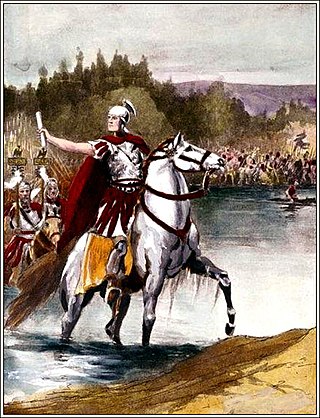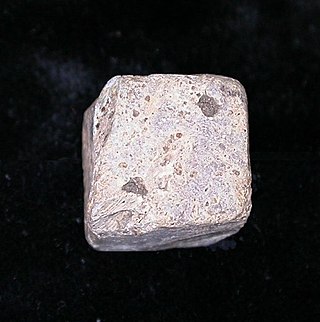Top Qs
Timeline
Chat
Perspective
Alea iacta est
Latin phrase From Wikipedia, the free encyclopedia
Remove ads
Remove ads
Alea iacta est ("The die is cast") is a variation of a Latin phrase (iacta alea est [ˈjakta ˈaːlɛ.a ˈɛs̺t]) attributed by Suetonius to Julius Caesar on 10 January 49 BC, as he led his army across the Rubicon river in Northern Italy, in defiance of the Roman Senate and beginning a long civil war against Pompey and the Optimates. The phrase is often used to indicate events that have passed a point of no return.

According to Plutarch, Caesar originally said the line in Greek rather than Latin, as ἀνερρίφθω κύβος anerrhī́phthō kýbos, literally "let a die be cast", metaphorically "let the game be played". This is a quote from a play by Menander, and Suetonius's Latin translation is slightly misleading, being merely a statement about the inevitability of what is to come, while the Greek original contains a self-encouragement to venture forward. The Latin version is now most commonly cited with the word order changed (Alea iacta est), and it is used both in this form, and in translation in many languages. The same event inspired another related idiom, "crossing the Rubicon".
Remove ads
Meaning and forms
Summarize
Perspective

Caesar probably borrowed the phrase from Menander, the famous Greek writer of comedies, as the phrase appeared in Menander's lost play Arrephoros ('The Bearer of Ritual Objects'),[note 1] and Caesar was known to have considered him a great playwright.[note 2] Plutarch reports that Caesar quoted these words in Greek:
Ἑλληνιστὶ πρὸς τοὺς παρόντας ἐκβοήσας, «Ἀνερρίφθω κύβος», [anerrhī́phthō kýbos] διεβίβαζε τὸν στρατόν.[3]
He [Caesar] declared in Greek with loud voice to those who were present "Let a die be cast" and led the army across.
Appian, also writing in Greek, reports a very similar phrase, and states that it was familiar (a well-known saying or quote):
καὶ εἰπὼν οἷά τις ἔνθους ἐπέρα σὺν ὁρμῇ, τὸ κοινὸν τόδε ἐπειπών· «Ὁ κύβος ἀνερρίφθω».
Then speaking like a man inspired, he surged across, uttering the familiar phrase, "Let the die be cast".
Suetonius, a contemporary of Plutarch and Appian, writing in Latin, has the quote in Latin instead of Greek:
Caesar: "... iacta alea est", inquit.[6]
Caesar said, "The die is cast".
In Latin alea refers to a game with dice and, more generally, a game of hazard or chance. Dice were common in Roman times and were usually cast three at a time. There were two kinds. The six-sided dice were known in Latin as tesserae and the four-sided ones (rounded at each end) were known as tali.[7] In Greek a die was κύβος kybos.[8]
Remove ads
See also
Notes
- Menander's Arrephoros (Ἀρρηφόρος, 'The Bearer of Ritual Objects') was also titled Auletris (Αὐλητρίς, 'The Courtesan Flute-Player'). Though this play is now lost, the following dialogue from it was preserved in Athenaeus of Naucratis's Deipnosophistae (book 13, paragraph 8): A:
If you've got any sense, you won't get married
and give up living like this. I'm married
myself—which is why I'm advising you not to do it.
B:It's all decided; the die's been cast.
A:Go ahead—and good luck. Because you're going
[1]
to throw yourself into a real sea of troubles now,
and not the Libyan or the Aegean sea...,
where less than three ships out of thirty
get wrecked. Not one married man escapes undamaged.
References
External links
Wikiwand - on
Seamless Wikipedia browsing. On steroids.
Remove ads
